16 May
1511 – Burial of Walter Fitzsimons, Archbishop of Dublin and Lord Deputy of Ireland, in the nave of St Patrick's Cathedral.
1532 – Resignation of Sir Thomas More as Chancellor.
1536 – Archbishop Cranmer visited Queen Anne Boleyn at the Tower of London. It is thought that his visit's purpose was to get Anne to confess to an impediment to her marriage and to consent to him dissolving her marriage to Henry VIII. This would disinherit and bastardise her daughter Elizabeth. Click here to read more.
1544 – Death of John Skewys, lawyer and chronicler.
1566 – Death of Patrick Ruthven, 3rd Lord Ruthven, a man who was involved in the murder of David Riccio, Mary, Queen of Scots's private secretary.
1567 – Death of Sir Anthony Browne, judge, at his home Weald Hall, South Weald, Essex. He had served Mary I as Chief Justice of the Common Pleas, but was removed from this office by Elizabeth I and made a Puisne Justice of the same court.
1568 – Mary, Queen of Scots landed at Workington after losing at the Battle of Langside.
1576 – Burial of Nicholas Bullingham, Bishop of Lincoln and Worcester. His burial was originally registered at Hartlebury (he died at Hartlebury Castle), but his tomb can now be found in the north aisle of Worcester Cathedral.
1579 – Death of George Freville, judge and 2nd Baron of the Exchequer.
1618 – Death of Dorothy Wadham (née Petre), founder of Wadham College, Oxford. She is buried in St Mary's Church, Ilminster.
1620 – Death of William Adams, navigator, in Hirado, Japan. He is thought to be the first Englishman to have reached Japan (arriving there in 1600) and was the inspiration for the character of John Blackthorne in the famous novel Shōgun.
17 May
1521 – Execution of Edward Stafford, 3rd Duke of Buckingham, for treason. Stafford was the great-grandson of Thomas of Woodstock, Edward III's youngest son, and his Plantagenet blood made him a threat to Henry VIII. In 1520, he was suspected of treason, and so Henry VIII ordered an investigation. Stafford was summoned to Court in April 1521 and arrested. He was imprisoned in the Tower of London and then tried for treason, with the charges including listening to prophesies of the King’s death and plotting to kill the King. He was found guilty by a jury of his peers and executed on Tower Hill.
1536 - Archbishop Thomas Cranmer, in the presence of Sir Thomas Audley, the Duke of Suffolk, the Earl of Oxford and others, declared that the marriage between Henry VIII and Anne Boleyn was null and void.
1536 - Sir Henry Norris, Sir Francis Weston, Mark Smeaton, William Brereton and George Boleyn, Lord Rochford, were executed on Tower Hill. Click here to read more about the executions.
1575 – Death of Matthew Parker, Archbishop of Canterbury, at Lambeth Palace. Parker had also served Queen Anne Boleyn as chaplain, and was known for his patronage of scholars.
1581 – Death of Sir William Cordell, lawyer and Speaker of the House of Commons, at The Rolls in Chancery Lane. He was buried in Long Melford church.
1601 – Burial of Anthony Bacon in St Olave's, London. Bacon was a spy, providing intelligence for William Cecil, Sir Francis Walsingham and Robert Devereux, 2nd Earl of Essex.
1610 – Death of Gervase Babington, theologian and Bishop of Worcester. He was buried in Worcester Cathedral.
18 May
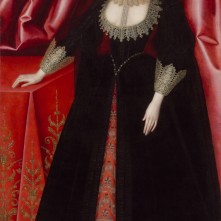
Mary, Lady Vere
1497 – Death of Katherine Woodville, wife of Henry Stafford, Duke of Buckingham, then Jasper Tudor, Duke of Bedford, and finally Richard Wingfield, whom she married without royal licence. Katherine was the sister of Elizabeth Woodville, wife of Edward IV. Her eldest son was Edward Stafford, 3rd Duke of Buckingham.
1515 – John Stewart, 2nd Duke of Albany, landed in Dumbarton with French soldiers to obtain the regency of Scotland.
1536 – Anne Boleyn's execution was postponed.
1554 – Execution of William Thomas, scholar and administrator. Thomas was hanged, drawn and quartered at Tyburn for his alleged involvement in Wyatt's Rebellion.
1581 – Birth of Mary, Lady Vere (née Tracy), gentlewoman and patron of clergymen.
19 May
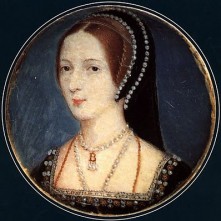
Anne Boleyn
1527 – Death of Henry Algernon Percy, 5th Earl of Northumberland, at Wressle. He was buried in Beverley Minster.
1536 – Archbishop Thomas Cranmer issued a dispensation for Henry VIII to marry Jane Seymour, because they were fifth cousins.
1536 - Execution of Anne Boleyn, second wife of Henry VIII, at the Tower of London. Click here to read more about her execution.
1554 – The future Elizabeth I was released from the Tower of London and allowed to go to Woodstock under house-arrest. She had been taken to the Tower on 18th March 1554 after her half-sister, Queen Mary I, ordered her arrest for her alleged involvement in Wyatt’s Rebellion.
1597 – Death of Richard Rogers, Bishop-Suffragan of Dover.
20 May
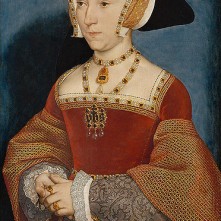
Jane Seymour
1512 – Alain de Chantrezac wrote to M. D'Aumont from Caen regarding a rumour of an English invasion: “Persistent rumour of invasion from England. One who came thence ten days ago says the men are ready but the ships cannot be so till the end of this month. The King will land at Calais, part of his army in Normandy and the rest at Fontarabie. Their 120 or 140 ships seem few for so large an army. The French victory beyond the Mountains and their distrust of Scotland cool the English somewhat; but the young Councillors, by whom the King is ruled, advise this invasion. English ships (15 or 16) have taken a bark of Dieppe and some fishing boats.”
1535 – The imprisoned Bishop John Fisher was made a Cardinal by Pope Paul III. It made no difference to his treatment, as he was executed 22nd June 1535.
1536 - Betrothal of Henry VIII and Jane Seymour.
1573 – Death of Robert Weston, Lord Chancellor of Ireland, in Dublin. He was buried beneath the altar in St Patrick's Cathedral, Dublin.
1579 – Burning of Matthew Hamont, alleged heretic, in the castle ditch at Norwich. He was considered an Arian.
1598 – Death of John Bullingham, Bishop of Gloucester. He died in Kensington and was buried in Gloucester Cathedral.
1620 – Burial of Mary Honywood (née Waters), “sustainer of protestant martyrs”. She died at Marks Hall and was buried at Lenham in Kent.
1935 – Cardinal Fisher and Sir Thomas More were canonised by Pope Pius XI.
21 May
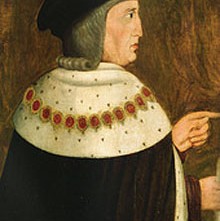
Thomas Howard, 2nd Duke of Norfolk
1508 – Death of Giles Daubenay, 1st Baron Daubeney, administrator, soldier, and diplomat. He was buried in St Paul's Chapel, Westminster Abbey.
1524 – Death of Thomas Howard, 2nd Duke of Norfolk, courtier, magnate and soldier, and grandfather of Anne Boleyn and Catherine Howard. He was created Duke of Norfolk in 1514 as a reward for his part in the English victory at the Battle of Flodden.
1527 – Birth of Philip II of Spain, King of Spain and consort of Mary I, at Valladolid, Spain. He was the son of Charles V, Holy Roman Emperor, and Isabella of Portugal.
1535 – The arrest of William Tyndale, Bible translator and religious reformer, in Antwerp, after he was tricked into leaving the English House owned by Thomas Pontz. He was condemned as a heretic and strangled, then burned in October 1536.
1558 – Death of William Glyn, Bishop of Bangor, at Bangor. He was buried in Bangor Cathedral.
1580 – Death of Sir John Thynne, member of Parliament and builder of Longleat. He was buried at Longbridge Deverill, Wiltshire.
22 May
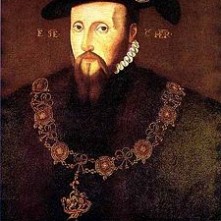
Edward Seymour, brother of Jane Seymour
1490 – Death of Edmund Grey, 1st Earl of Kent.
1537 – Edward Seymour, brother of Jane Seymour, was sworn in as a Privy Councillor.
1538 – The burning of John Forest, Franciscan friar and martyr, at Smithfield for heresy, for his allegiance to Rome.
1539 – Probable birthdate of Edward Seymour, 1st Earl of Hertford and son of Edward Seymour, Duke of Somerset (the Edward mentioned above). Hertford was also the husband of Katherine Grey, sister of Lady Jane Grey.
1570 – Death of John Best, Bishop of Carlisle. He was buried in Carlisle Cathedral.



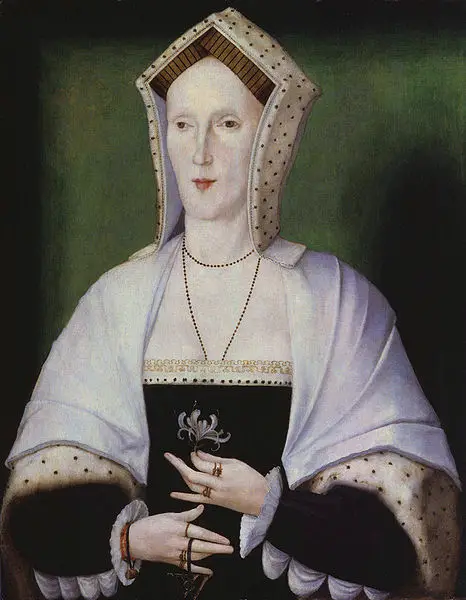
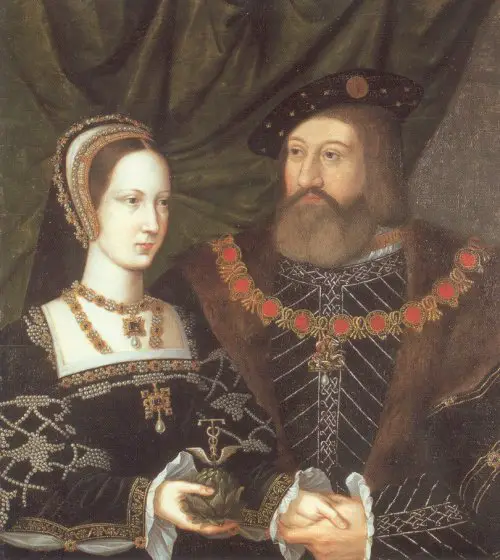
Leave a Reply